Paul C. Giannelli
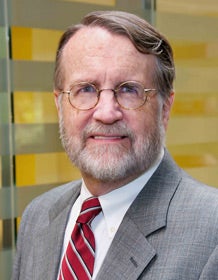 Paul C. Giannelli
Paul C. Giannelli
Albert J. Weatherhead III and Richard W. Weatherhead Professor Emeritus of Law, Distinguished University Professor
Areas of Expertise: Evidence and Military Law
Articles
Giannelli on our Scholarly Commons
Book Chapters
Paul C. Giannelli, Scientific Evidence, in 4 Encyclopedia of Crime and Justice 1373 (Joshua Dresser ed., 2d ed. 2002).
-
Encyclopedia of Crime and Justice by
Call Number: HV6017 .E52 2002ISBN: 0028653238Publication Date: 2002
Paul C. Giannelli, DNA Databanks, in Encyclopedia of Ethical, Legal, and Policy Issues in Biotechnology 413 (Thomas H. Murray & Maxwell J. Mehlman eds., 2000) (with Sharona Hoffman and Wendy E. Wagner).
-
Encyclopedia of Ethical, Legal, and Policy Issues in Biotechnology by
Call Number: TP248.16 .E539 2000ISBN: 0471176125Publication Date: 2000This set is comprehensive and technically literate and more informative on regulation and policy issues. Thomas Murray is a world-renowned leader in this field. This set is comprehensive and technically literate with very informative entries on regulation and policy issues.
Paul C. Giannelli, The Daubert Trilogy and the Law of Expert Testimony, in Evidence Stories 181 (Richard Lempert ed., 2006).
-
Evidence Stories by
Call Number: KF8934 .E944 2006ISBN: 9781599410067Publication Date: 2006This publication contains essays by leading evidence scholars discussing the stories behind landmark cases and illuminating principles and materials across the evidence curriculum. The seldom-told stories behind cases in which evidence plays a significant role are told with important illustrations of the development, application, and importance of the rules of evidence.
Paul C. Giannelli, DNA Profiling, in Race to Injustice: Lessons Learned from the Duke LaCrosse Rape Case 323 (Michael Seigel ed., 2009).
-
Race to Injustice by
Call Number: KFN7977 .R33 2009ISBN: 9781594605147Publication Date: 2009The American criminal justice system, though undoubtedly one of the best in the world, is far from perfect. Every once in a while a notorious case comes along and reveals its uglier side¿¿for instance, its differential treatment of whites and people of color. Such cases often garner huge amounts of national media attention and capture the sustained interest of a normally restless American public. Whatever their outcome, they provide academics with exceptional opportunities to study, learn, and teach about the justice system. They also offer the chance to study related matters, such as the conduct of particular law enforcement and other officials, as well as the underlying causes of crime and the public's reaction to it. The Duke lacrosse players' rape prosecution is one such case. One evening in March 2006, members of the lacrosse team held an off-campus party where alcohol was served and two erotic dancers were hired to perform. A disagreement broke out between the dancers and the players; later, one of the former, Crystal Mangum, alleged that three players had raped her. Mangum was black and relatively poor; the accused were white and relatively privileged. Up for re-election in a jurisdiction with many African American voters, District Attorney Mike Nifong pursued the case very aggressively. He used questionable identification procedures and was unusually outspoken in numerous local and national media appearances. Even after DNA evidence indicated that the defendants had not engaged in sexual activity with the victim, he declined to drop the charges. Worse, he hid other exculpatory DNA evidence. The case split the Duke campus, the Durham community, and observers at large into sharply divided factions. Desperately trying to preserve its hard-won reputation as an upper-echelon school, the university cancelled the lacrosse season, suspended the three indicted players, and commenced a series of internal investigations. After months of dramatic twists and turns, the North Carolina Bar Association charged Nifong with violating several ethics provisions based on his handling of the prosecution. Within days of being charged, Nifong relinquished the case to the North Carolina Attorney General who, after reviewing the proof, dismissed all remaining charges against the lacrosse players and publicly declared their innocence. After a thirteen-month ordeal, the case was finally over. Eventually, the disgraced Nifong was disbarred.
Paul C. Giannelli, Reference Guide on Forensic Identification Expertise, in Reference Manual on Scientific Evidence 129 (3rd ed. 2011) (with Edward J. Imwinkelried, and Joseph L. Peterson).
-
Reference Manual on Scientific Evidence (3rd ed)
Call Number: KF8961 .R44 2011Publication Date: 2011
Paul C. Giannelli, General Acceptance of Scientific Tests - Frye and Beyond, in Scientific and Expert Evidence 11 (Edward J. Imwinkelried ed., 2d ed. 1981).
Paul C. Giannelli, Understanding Evidence, in Understanding Law School 129 (2004).
Paul C. Giannelli, Writ of Certiorari, Confession, Ex Post Facto, Larceny, & Mandamus, in World Book Encyclopedia (1990).
Books
-
Courtroom Criminal Evidence by
Call Number: KF9662.C68 1987ISBN: 0874732891Publication Date: 1987 (1988-1992 supplements)This comprehensive handbook reviews relevant common law, the Federal Rules of Evidence, and federal statutes. Topics covered include procedural aspects, admissability, sufficiency, scientific evidence, character and habit evidence, exclusionary rules, and the various hearsay exceptions. -
Courtroom Criminal Evidence (2nd ed) by
Call Number: KF9662.C68 1993ISBN: 1558341277Publication Date: 1993 (1994 -1997 supplements) -
Courtroom Criminal Evidence (3rd ed) byCall Number: KF9662.C68 1998Publication Date: 1998 (1999-2004 supplements)
-
Courtroom Criminal Evidence (4th ed) byPublication Date: 2005 (2006-2010 supplements)
-
Courtroom Criminal Evidence (5th ed) by
Call Number: KF9662 .C68 2011ISBN: 9781422498491Publication Date: 2011 (2012-2016 supplements) -
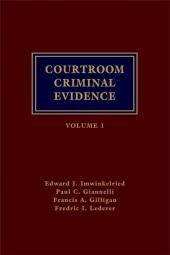 Courtroom Criminal Evidence (6th ed.)
by
Call Number: KF9662 .C68 2016ISBN: 9781522109181Publication Date: 2016 (2017 - 2021 supplements)Learn about the latest developments in evidence law, including evidentiary issues posed by fax and e-mail, scientific and polygraph evidence, and more.
Courtroom Criminal Evidence (6th ed.)
by
Call Number: KF9662 .C68 2016ISBN: 9781522109181Publication Date: 2016 (2017 - 2021 supplements)Learn about the latest developments in evidence law, including evidentiary issues posed by fax and e-mail, scientific and polygraph evidence, and more. -
Evidence: Cases and Materials (6th ed) by
Call Number: KF8934.S77 2002ISBN: 9780314257123Publication Date: 2002Written to impress upon students that the law of evidence remains far from "federalized." Many states remain without local counterparts to the Federal Rules of Evidence and, even where such counterparts exist, state law frequently varies substantially from the federal pattern. These considerations, together with the fact that vast areas of evidence are outside the purview of the federal rules, warrant continuing attention to state law. -
Evidence: Cases and Materials (7th ed) by
Call Number: KF8934 .S77 2007ISBN: 9780314168795Publication Date: 2007The most significant change in the Seventh Edition deals with the revolution in Confrontation Clause jurisprudence occasioned by the Supreme Court's decisions in Crawford v. Washington (2004) and Davis v. Washington (2006). The confrontation section of the book in Chapter 13 is completely revised and substantially expanded. Extensive notes describe the operation of the earlier system of confrontation analysis, the immediate impact, and the areas of continuing uncertainty under Crawford and Davis. The new edition also continues the trend in the Sixth Edition, which dramatically revamped the book's treatment of scientific evidence, and includes a number of new cases and notes regarding scientific evidence because of the dynamic nature of that particular area of evidence law. -
Evidence: Cases and Materials (8th ed) by
Call Number: KF8934 .S77 2014ISBN: 9780314281470Publication Date: 2013This comprehensive look at the law of evidence has been extensively updated and made current since the previous edition. One of the most significant changes in the Eighth Edition deals with the revolution in Confrontation Clause jurisprudence occasioned by the Supreme Court's decision in Crawford v. Washington (2004). Since the last edition, the Supreme Court has decided half a dozen cases involving Crawford's approach. Substantial additions to the detailed notes regarding confrontation reflect those new developments. Also, new material concerning scientific evidence has been added because of the dynamic nature of that particular area of evidence law-for example, the National Academy of Science's 2009 landmark report on forensic science. Finally, a number of cases and notes on new technologies, such as e-mail, computer simulations, social networking websites, and other the internet issues have been added. -
Giannelli Evidence (3rd ed) by
Call Number: KFO540 .G52 2010ISBN: 9780314927149Publication Date: 2010 (2011- 2020 supplements) -
Giannelli Evidence (4th ed) by
Call Number: OhioLinkISBN: 9781731920751Publication Date: 2020 (2021-- supplements)From the publisher: "Evidence, 4th examines the Ohio Rules of Evidence, rule by rule. The text of each rule is presented, followed by expert commentary and discussion of how the rule has been interpreted and applied by the Ohio courts." -
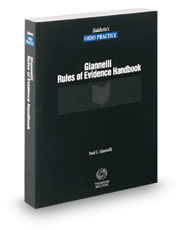 Giannelli Rules of Evidence Handbook (Annually 2010 - )
by
Call Number: KFO540.G53Publication Date: Annually 2010 -From the publisher: "This softcover volume, Rules of Evidence Handbook, is a quick reference to the Ohio Rules of Evidence, selected sections..Authors' expert comments shed light on each rule of Ohio evidence, emphasizing changes in the rules, as well as their application and interpretation by the Ohio courts since 1980.
Giannelli Rules of Evidence Handbook (Annually 2010 - )
by
Call Number: KFO540.G53Publication Date: Annually 2010 -From the publisher: "This softcover volume, Rules of Evidence Handbook, is a quick reference to the Ohio Rules of Evidence, selected sections..Authors' expert comments shed light on each rule of Ohio evidence, emphasizing changes in the rules, as well as their application and interpretation by the Ohio courts since 1980. -
-
Giannelli Snyder Evidence (2nd ed) by
Call Number: KFO540.G52 2001ISBN: 0832208574Publication Date: 2001 (2005 supplement) -
Giannelli Snyder Rules of Evidence Handbook (Annually 1996-2009) by
Call Number: KFO540.G53Publication Date: Annually 1996-2009 -
Katz & Giannelli Ohio Criminal Justice (Annually 1997-2007) byCall Number: KFO561.A29O32Publication Date: Annually 1997-2007
-
 Katz & Giannelli Ohio Criminal Laws and Rules (Annually 2008 - )
by
Call Number: KFO561.A29O32Publication Date: Annually 2008 -From publisher: "Providing a comprehensive criminal law reference for use in court, office, classroom, or police cruiser, Ohio Criminal Laws and Rules is written for everyone involved with Ohio’s criminal justice system. Contents include the full text of Ohio Revised Code Title 29 and selected provisions of the Ohio Constitution..."
Katz & Giannelli Ohio Criminal Laws and Rules (Annually 2008 - )
by
Call Number: KFO561.A29O32Publication Date: Annually 2008 -From publisher: "Providing a comprehensive criminal law reference for use in court, office, classroom, or police cruiser, Ohio Criminal Laws and Rules is written for everyone involved with Ohio’s criminal justice system. Contents include the full text of Ohio Revised Code Title 29 and selected provisions of the Ohio Constitution..." -
Katz Giannelli Criminal Law by
Call Number: KFO561.K37 1996Publication Date: 1996 (1997-2002 supplements) -
Katz Giannelli Criminal Law (2nd ed) by
Call Number: KFO561.K37 2003ISBN: 9780832209833Publication Date: 2003 (2004-2008 supplements) -
Katz Giannelli Criminal Law (3rd ed) by
Call Number: KFO561 .K37 2009ISBN: 9780314903587Publication Date: 2009 - (annual supplement) -
Ohio Evidence Manual byCall Number: KFO540.G5ISBN: 0832200263Publication Date: 1982-1994 (loose-leaf)This looseleaf reference work for Ohio practitioners includes: sample foundational questions, jury instructions on evidentiary matters, annotations to Ohio reported and unreported cases, Federal Rules, and the complete Ohio Rules of Evidence. The volume integrates the Ohio Rules with Revised Code provisions on evidence and Ohio common law precedents.
-
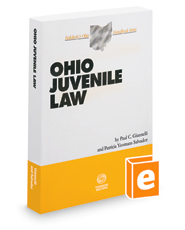 Ohio Juvenile Law (2001 ed)
by
Call Number: KFO595.O38Publication Date: 2001From the publisher: "Ohio Juvenile Law is a straightforward treatise containing selected provisions of the state revised code and rules of procedure and covering all major aspects of juvenile law..."
Ohio Juvenile Law (2001 ed)
by
Call Number: KFO595.O38Publication Date: 2001From the publisher: "Ohio Juvenile Law is a straightforward treatise containing selected provisions of the state revised code and rules of procedure and covering all major aspects of juvenile law..." -
 Ohio Juvenile Law (Annually 1985-2000)
by
Call Number: KFO595.O38Publication Date: Annually 1995-2000From the publisher: "Ohio Juvenile Law is a straightforward treatise containing selected provisions of the state revised code and rules of procedure and covering all major aspects of juvenile law..."
Ohio Juvenile Law (Annually 1985-2000)
by
Call Number: KFO595.O38Publication Date: Annually 1995-2000From the publisher: "Ohio Juvenile Law is a straightforward treatise containing selected provisions of the state revised code and rules of procedure and covering all major aspects of juvenile law..." -
 Ohio Juvenile Law (Annually 2002 - 2016)
by
Call Number: KFO595.O38Publication Date: Annually 2002 - 2016From the publisher: "Ohio Juvenile Law is a straightforward treatise containing selected provisions of the state revised code and rules of procedure and covering all major aspects of juvenile law..."
Ohio Juvenile Law (Annually 2002 - 2016)
by
Call Number: KFO595.O38Publication Date: Annually 2002 - 2016From the publisher: "Ohio Juvenile Law is a straightforward treatise containing selected provisions of the state revised code and rules of procedure and covering all major aspects of juvenile law..." -
-
Ohio Rules of Evidence Handbook (2nd ed) by
Call Number: KFO540.G5 1986ISBN: 0832201499Publication Date: 1986This guidebook analyzes the Ohio Rules of Evidence, emphasizing the changes in the Rules and their application and interpretation by Ohio courts since 1980. The full text of the Ohio Rules of Evidence and the Official Staff Notes are included in the book. A chart comparing Ohio and Federal Rules of Evidence is provided in the work. -
Ohio Rules of Evidence Handbook (3rd ed) byCall Number: KFO540.G5 1991ISBN: 0832203734Publication Date: 1991
-
Ohio Rules of Evidence Handbook (4th ed) by
Call Number: KFO540.G5 1993ISBN: 0832204668Publication Date: 1993 -
Ohio Rules of Evidence Handbook (5th ed) by
Call Number: KFO540.G5 1994ISBN: 0832205362Publication Date: 1994 -
-
Problems in Evidence (6th ed) by
Call Number: KF8935.B753 2018ISBN: 9781683281849Publication Date: 2018Seventy-two new problems have been added in this new edition. A number of these new problems concern authentication of social media and electronic evidence and the authentication of DNA with interesting chain of custody problems. Additional problems have been added dealing with expert evidence, including validation of new types of expert and lay testimony regarding cell tower tracking. Three new problems in the area of attorney-client privilege examine the application Federal Rule of Evidence Rule 502. Many of the new problems draw their inspiration from recent appellate opinions dealing with cutting-edge evidence issues. -
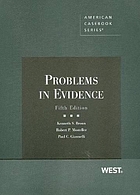 Problems in Evidence, 5th
by
Call Number: KF8934 .B75 2011ISBN: 9780314198891Publication Date: 2010Many of the new problems added to this edition concern the Supreme Court's new approach to confrontation in Crawford v. Washington. A number have been added for expert testimony, and revisions have been made regarding DNA evidence. Others deal with character evidence in criminal cases, including other crimes evidence and prior sexual assaults in both civil and criminal cases. Some examine the challenges presented by new technology when evidence comes from cell phones and computer hard drives. A new problem also raises issues that the new federal rule concerning "inadvertent disclosure" of privileged attorney-client material can help resolve.
Problems in Evidence, 5th
by
Call Number: KF8934 .B75 2011ISBN: 9780314198891Publication Date: 2010Many of the new problems added to this edition concern the Supreme Court's new approach to confrontation in Crawford v. Washington. A number have been added for expert testimony, and revisions have been made regarding DNA evidence. Others deal with character evidence in criminal cases, including other crimes evidence and prior sexual assaults in both civil and criminal cases. Some examine the challenges presented by new technology when evidence comes from cell phones and computer hard drives. A new problem also raises issues that the new federal rule concerning "inadvertent disclosure" of privileged attorney-client material can help resolve. -
Questions and Answers: Evidence (4th ed.) by
Call Number: Online Study AidsISBN: 1531009913Publication Date: 2018From the publisher: "Questions and Answers: Evidence helps you develop a better, fuller understanding of the law of evidence that will carry you through your evidence class and on into practice. This indispensable supplement, part of our well-known Questions and Answers series, helps you apply concepts as you learn them so that you can prepare more effectively for class and gain a competitive edge on exams...." -
Questions and Answers: Evidence (3rd) by
Call Number: OhioLinkISBN: 9780769864228Publication Date: 2013 -
Scientific Evidence by
Call Number: KF8961.G53 1986ISBN: 0872159361Publication Date: 1986 (1987-1991 supplements)This treatise comprehensively covers issues of scientific evidence and discusses frequently encountered types of scientific evidence. Modern scientific methodology is examined, including: laser techniques for visualizing fingerprints, electrophoresis, hypnotic enhancement of memory, voiceprints, and scanning electron microscopy. -
Scientific Evidence (2nd ed) by
Call Number: KF8961.G53 1993ISBN: 1558340556Publication Date: 1993 (1994-1998 supplements) -
Scientific Evidence (3rd ed) byCall Number: KF8961.G53 1999ISBN: 0327049855Publication Date: 1999 (2000-2006 supplements)
-
Scientific Evidence (4th ed) by
Call Number: KF8961.G53 2007ISBN: 9780820575766Publication Date: 2007 (2008-2011 supplements) -
Scientific Evidence (5th ed) by
Call Number: KF8961 .G53 2012ISBN: 9780769859118Publication Date: 2012 (2013- 2020 supplements) -
Scientific Evidence (6th ed.) by
Call Number: KF8961.G53 2020ISBN: 9781522197935Publication Date: 2020 (2021-2022 supplements)"Organized logically and written in clear terms for the active litigator, Scientific Evidence, Sixth Edition, covers rules and precedents relating to admissibility, constitutional limitations, discovery, expert testimony, laboratory reports, and chain of custody. It then analyzes the most frequently encountered scientific evidence and the latest developments in scientific evidence, such as the use of probabilistic genotyping software to analyze complex DNA samples, neuroscience, facial recognition, drugged driving testing, blockchain, and the use of liquid chromatography tandem mass spectrometry in drug testing."-- -
-
Understanding Evidence (2nd ed) by
Call Number: KF8935 .G52 2005ISBN: 0820564095Publication Date: 2005 -
Understanding Evidence (3rd ed) by
Call Number: KF8935 .G52 2009ISBN: 9781422470381Publication Date: 2009This Understanding treatise presents the essential topics in evidence law cogently and concisely. While it was written primarily for students in Evidence and Trial Practice courses, the Key Points summary at the end of each chapter and the inclusion of the current Federal Rules of Evidence in an appendix make this treatise an excellent reference for busy attorneys. Understanding Evidence begins with an overview of Evidence law followed by an explanation of the roles of the judge and jury. The remaining chapters are organized under the following topics: Procedural Framework of Trial Relevancy Witnesses Real and Demonstrative Evidence Writings Hearsay Privileges Substitutes for Evidence This treatise extensively discusses and cites the Federal Rules of Evidence. Cases, statutes, other rules, and secondary sources are also cited, providing a comprehensive framework for understanding evidence law. -
Understanding Evidence (4th ed) by
Call Number: KF8935 .G52 2013ISBN: 9780769859897Publication Date: 2013 -
Understanding Evidence (5th ed) by
Call Number: KF8935.G52 2018ISBN: 9781531009892Publication Date: 2018 -
 Understanding Federal and California Evidence
by
Call Number: KF8935 .G523 2014ISBN: 9780769853918Publication Date: 2014From the publisher:"The California edition expands the latest edition of the well-established treatise Understanding Evidence to explore California's unique approach. Each chapter begins with the federal doctrine, followed by a section on how California approaches the topic. The Appendices include the California Evidence Code. The book is primarily intended as a reference for law school civil procedure students in California. However, its treatment of recent developments may make it useful to some practitioners as well."
Understanding Federal and California Evidence
by
Call Number: KF8935 .G523 2014ISBN: 9780769853918Publication Date: 2014From the publisher:"The California edition expands the latest edition of the well-established treatise Understanding Evidence to explore California's unique approach. Each chapter begins with the federal doctrine, followed by a section on how California approaches the topic. The Appendices include the California Evidence Code. The book is primarily intended as a reference for law school civil procedure students in California. However, its treatment of recent developments may make it useful to some practitioners as well."